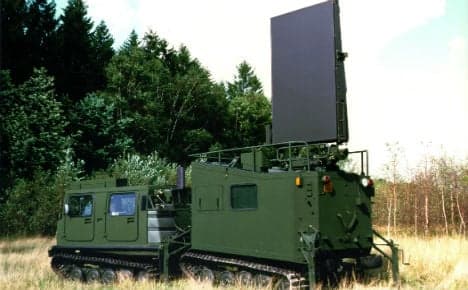Greek corruption case implicates radar firm

A Greek government corruption scandal has dragged a Swedish company into the quagmire after accusations were made that a Swedish radar salesman lined a public servant's pockets in the procurement bid. The case has been deemed too old to make it to a Swedish court.
The former deputy head of weapons contracts at the Greek defence ministry has stashed several million euro in bank accounts across the world, Greek media reported. Antonis Kantas has now given investigators a long list of companies that gave him money, seemingly at the start of procurement bids.
The Swedish company, Ericsson Microwave, was among the potential weapons sellers, Kantas has revealed. He claimed that an agent representing the Swedish radar equipment firm handed him 240,000 euros (2.1m kronor).
The sum allegedly handed over by the Swedes' agent was minor in comparison to the vast sums that were transferred by other bidders to Kantas, who has not given the name of the agent.
The suspected transactions took place during the nineties and early noughties. Swedish arms manufacturer Saab has since bough Ericsson Microwave and stated on its web site that Greece was among the countries who had purchased the technology, reported Sveriges Radio (SR) on Thursday. A Saab representative told SR there would be no comment on the matter.
There will likely not be a criminal investigation on the part of the Swedes.
"As far as I can tell from the information available in the media, it could be criminal but has passed its statute of limitations," said Gunnar Stetler, chief national prosecutor specializing in corruption.
He told the TT news agency that there had been an investigation into Ericsson Microwave's financial transactions in the 1990s, but could not confirm whether it was related to any business dealings in Greece.
Estimates of how extensive they are vary, but pay-offs in the shape of consultancy fees are not uncommon in the arms and military technology sector.
"Studies suggest that corruption in the arms trade contributes roughly 40 per cent to all corruption in global transactions," states the summary by Stockholm-based arms trade monitors Sipri.
"This corruption exacts a heavy toll on purchasing and selling countries, undermining democratic institutions of accountability and diverting valuable resources away from pressing social needs towards corrupt ends."
Comments
See Also
The former deputy head of weapons contracts at the Greek defence ministry has stashed several million euro in bank accounts across the world, Greek media reported. Antonis Kantas has now given investigators a long list of companies that gave him money, seemingly at the start of procurement bids.
The Swedish company, Ericsson Microwave, was among the potential weapons sellers, Kantas has revealed. He claimed that an agent representing the Swedish radar equipment firm handed him 240,000 euros (2.1m kronor).
The sum allegedly handed over by the Swedes' agent was minor in comparison to the vast sums that were transferred by other bidders to Kantas, who has not given the name of the agent.
The suspected transactions took place during the nineties and early noughties. Swedish arms manufacturer Saab has since bough Ericsson Microwave and stated on its web site that Greece was among the countries who had purchased the technology, reported Sveriges Radio (SR) on Thursday. A Saab representative told SR there would be no comment on the matter.
There will likely not be a criminal investigation on the part of the Swedes.
"As far as I can tell from the information available in the media, it could be criminal but has passed its statute of limitations," said Gunnar Stetler, chief national prosecutor specializing in corruption.
He told the TT news agency that there had been an investigation into Ericsson Microwave's financial transactions in the 1990s, but could not confirm whether it was related to any business dealings in Greece.
Estimates of how extensive they are vary, but pay-offs in the shape of consultancy fees are not uncommon in the arms and military technology sector.
"Studies suggest that corruption in the arms trade contributes roughly 40 per cent to all corruption in global transactions," states the summary by Stockholm-based arms trade monitors Sipri.
"This corruption exacts a heavy toll on purchasing and selling countries, undermining democratic institutions of accountability and diverting valuable resources away from pressing social needs towards corrupt ends."
Join the conversation in our comments section below. Share your own views and experience and if you have a question or suggestion for our journalists then email us at [email protected].
Please keep comments civil, constructive and on topic – and make sure to read our terms of use before getting involved.
Please log in here to leave a comment.